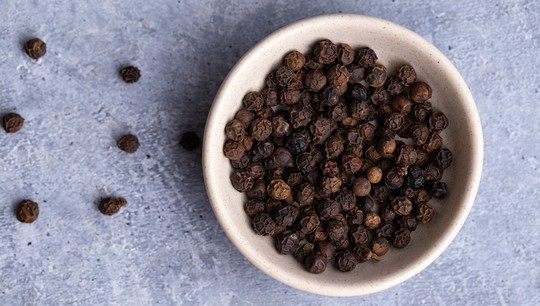Breakthrough Submicron Capsules Enhance Piperine Digestion for Optimal Absorption
Scientists of the Ural Federal University and the Institute of Metal Physics of the Ural Branch of the Russian Academy of Sciences have developed a technology that ensures efficient delivery to the body and full assimilation of piperine. Piperine is a pungent substance in black pepper that has a number of useful biological activities. The basic idea is to place piperine in a capsule that is easily transported and absorbed by the body. An article describing the technology has been published in the journal Food Hydrocolloids. The research was supported by the Russian Science Foundation (Grant No. 20-66-47017).
Piperine has cardioprotective, antidiabetic, antioxidant, anti-inflammatory, and antitumor activities. In addition, piperine contributes to the prevention of various neurodegenerative diseases. However, its use is hampered by its low dissolution and absorption rate in the human body. To solve this problem, scientists have encapsulated piperine in capsules – polymer particles smaller than one micron in size.
“The advantages of submicron capsules in this case are stability and compatibility with the environment of the gastrointestinal tract, the size of the capsules contributes to high-quality absorption of their contents,” explains Maxim Mironov, Professor of the Department of Technology of Organic Synthesis at the UrFU, head of the research group and co-author of the article.
Colleagues have prepared the world’s first submicron carriers by polyelectrolyte self-assembly of fucoidan and chitosan biopolymers using a crosslinking agent. Fucoidan, a widely used natural medicinal product, was extracted from fresh Ascophyllum algae growing in the White Sea and the Barents Sea. Fucoidan complexes well with chitosan, which is abundant in nature, harmless, biocompatible and biodegradable.
“Fucoidan is an anionic, or negatively charged, biopolymer, and chitosan is cationic, or positively charged. It’s a perfect pair for self-assembly. The negatively charged groups of fucoidan immediately interacted with the positive amino groups of chitosan. Our research group developed an original method to cross-link fucoidan and chitosan molecules using a cross-linking agent. This leads to the formation of a miniaturized container that encapsulates piperine. The productivity of piperine encapsulation was about 93%, which is very good,” says Maxim Mironov.
In recent years, science has proposed many systems based on nano- and submicron chitosan particles for targeted delivery of biologically active substances, including piperine. However, these systems are only stable in the form of colloidal solutions – suspensions of nanoscale particles. Such solutions can be degraded by microbiological decomposition and are inconvenient to store and transport. At the same time, drying of such systems leads to loss of biological activity.
In vitro experiments in an environment simulating gastrointestinal conditions showed significant release of piperine from the container particles and a much higher dissolution rate, 6 to 12 hours, than unencapsulated piperine.
The antioxidant activity of particles containing piperine was also significantly higher than that of unencapsulated piperine. The research team hypothesized that the internal antioxidant activity of fucoidan, the main component of the encapsulated particles, played a role. Piperine, in turn, neutralized hydroxyl radicals (OH) in the aqueous solution, which are dangerous because they damage cells, causing inflammation and malignant tumors.
Based on the results, the scientists concluded that the obtained submicron fucoidan-chitosan particles are suitable for encapsulating piperine, improving its delivery to the body and its absorption.
Emmanuel Mensah (Ghana), a graduate of the UrFU Master’s program, and Emmanuella Bulya (Nigeria), a postgraduate student, made a great contribution to the research conducted. According to Maxim Mironov, the development of the publication activity of young foreign scientists is supported by the Master’s program in Food Biotechnology, which is taught in English at the Ural Federal University.

